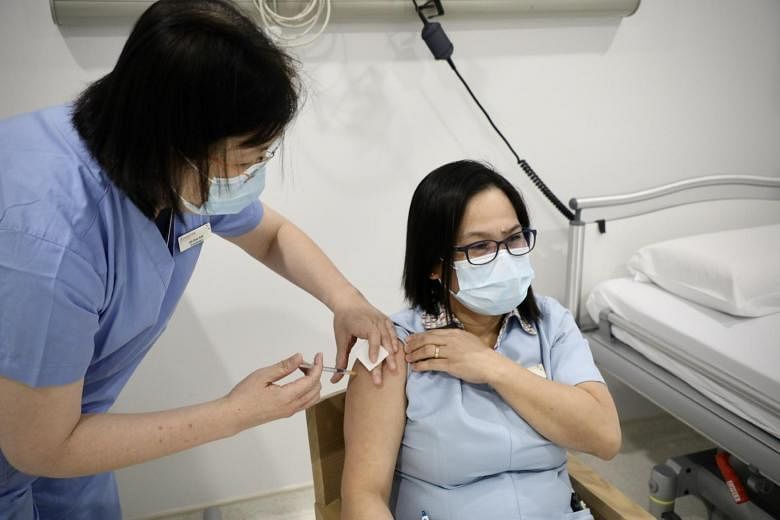SINGAPORE - Employers should take the Covid-19 vaccine when it is offered, and strongly encourage their employees and colleagues to do so as well, Singapore's chief health scientist, Professor Tan Chorh Chuan, said on Thursday (March 18).
He was delivering the keynote address at a webinar organised by the Singapore Business Federation.
The webinar, which was targeted at C-level executives, senior management and human resources directors and managers, aimed to address questions on the implications of Covid-19 vaccination for businesses, as well as how companies can continue to manage and maintain their operations during the pandemic.
Prof Tan noted that the two vaccines currently approved for use here - Pfizer and Moderna - "are highly effective, and both have a very good safety profile", citing clinical trials and real world data as evidence.
He also explained concepts such as herd immunity - how people who cannot take the vaccine are indirectly protected if a significant number of the population are vaccinated.
But there are factors, such as viral variants, that can affect public health control and the effectiveness of vaccines, which means more people would need to be vaccinated.
"Vaccination is a game changer in that it allows us to progressively reach the goal that we want, which is a greater normalisation of the way we live and work," said Prof Tan.
"But we should not expect it to be a smooth straight line. Towards the end, there will be some twists and turns, and we have to be agile and adaptable in the process."
A panel discussion followed, involving business leaders such as Mr Alex Hungate, president and chief executive of ground-handler and in-flight caterer Sats, and Ms Kwee Wei-Lin, president of the Singapore Hotel Association.
The topics discussed included whether businesses should differentiate between employees based on vaccination status, and how employers could encourage their employees to go for vaccinations.
Ms Kwee said there are incentives to vaccination in the hospitality industry, such as a reduction in the number of routine tests required for individuals who are vaccinated.
"But we have developed multiple protocols. the Ministry of Health has also given us different protocols of dealing with foreign travellers," she said.
"We see vaccination as an additional tool in our fight against Covid-19."
Mr Hungate spoke about his experience getting Sats employees to volunteer for vaccination.
The volunteer rate was not sufficient at the beginning, he said. What helped was a process to roster people to go to a vaccination centre during working hours to facilitate one-on-one discussions with a medical professional, where they could raise any concerns they had.
"You have to make it easy for people to have that conversation with a healthcare professional... and not make it something they have to do in their free time. I think it's the company's obligation to make that time for them," Mr Hungate said.
About 90 per cent of employees at Sats have been vaccinated.
"The key thing is that at no time did we force anybody to take the vaccine. We just made it very convenient and clear to them what the risks were, and that it was their individual choice," he said.












